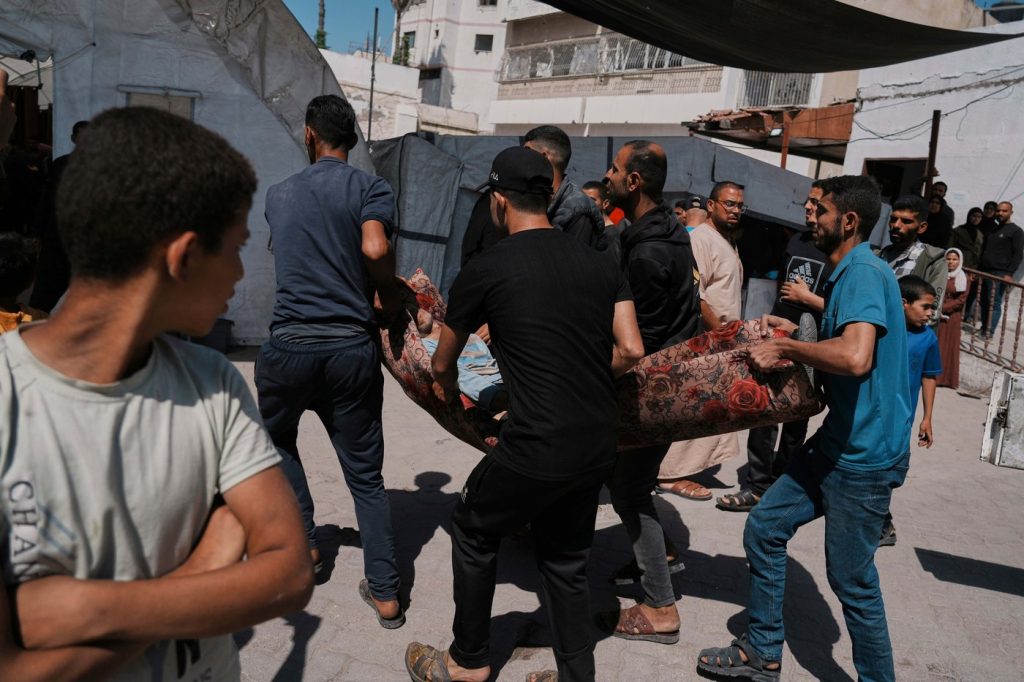DEIR AL-BALAH, Gaza Strip (AP) – On Friday, Hamas reported that it was still reviewing a U.S. proposal for a temporary ceasefire in the Gaza Strip, which had seen new Israeli airstrikes resulting in the deaths of 27 individuals, according to hospital officials. The proposal has already been approved by Israeli officials but received a cautiously negative reaction from the militant group.
U.S. President Donald Trump mentioned on the same day that negotiators were nearing a deal for Gaza. Trump indicated to reporters in Washington that the parties involved were "very close to an agreement" and expressed optimism that Hamas might want to conclude the ongoing conflict. However, details of the ceasefire proposal from U.S. negotiators remain undisclosed.
According to an anonymous Hamas official and an Egyptian official, the U.S. proposal includes a 60-day pause in hostilities and calls for serious negotiations that could lead to a long-term truce. Additionally, assurances are sought to ensure that Israel will not resume military actions following the release of hostages, a situation reminiscent of events from March.
Hamas issued a brief statement indicating that consultations with various Palestinian factions were ongoing regarding the U.S. proposal put forth by envoy Steve Witkoff. United Nations spokesperson Stephane Dujarric urged all parties to demonstrate "political courage" in order to reach an agreement.
While there may have been modifications to the proposal since it was first shared, previous versions suggested that Israeli forces would withdraw to their prior positions before the latest ceasefire ended. In return, Hamas would release 10 living hostages, along with a number of deceased individuals, during the proposed ceasefire. This would exchange for the release of over 1,100 Palestinians imprisoned by Israel, including 100 who are serving long sentences for serious attacks.
Under the terms of the proposal, hundreds of trucks carrying food and humanitarian aid would be permitted entry into Gaza. Experts have pointed out that a blockade imposed by Israel for nearly three months has significantly impacted the population, pushing many individuals to the brink of famine.
Qatar’s ambassador to the United Nations, Alya Ahmed Saif Al-Thani, stated on Friday that extensive negotiations are still taking place regarding the current proposal, with efforts being coordinated between her country, the United States, and Egypt. Al-Thani emphasized the earnest commitment to resolving the dire situation in Gaza.
Despite the ongoing discussions, a senior Hamas official, Bassem Naim, criticized the U.S. proposal for failing to address critical demands, particularly the need to halt the conflict and alleviate famine conditions.
This uncertainty surrounding the proposed ceasefire coincides with reports from hospital officials indicating that 27 people were killed in airstrikes on Friday. Among the victims were 13 individuals, including eight children, who died when a strike hit a tent in Khan Younis. The Israeli military had not issued a comment regarding the airstrikes by the time of reporting.
Additionally, 12 bodies, including three women, were transported to Shifa Hospital from the Jabaliya refugee camp, while the Palestinian Red Crescent Society reported that two more bodies were taken to a hospital in Gaza City. Hospital officials indicated that at least 72 people had been killed in the prior day's airstrikes, with numbers potentially higher due to ongoing fighting in the area.
Since the onset of the conflict on October 7, 2023, over 54,000 Gaza residents, predominantly women and children, have lost their lives, as reported by the Gaza Health Ministry. The wartime toll does not differentiate between combatants and civilians. The conflict began with a Hamas attack that resulted in the deaths of around 1,200 Israelis, mainly civilians, and the capture of 250 hostages, of which 58 remain in Gaza, although Israeli officials suspect many may be dead.
Amidst these ongoing tragedies, residents of Gaza express a tempered hope for a ceasefire, shaped by prior disappointments over unfulfilled negotiations. Mohammed Abed, a local resident, described the dire conditions as a "war of starvation, death, siege," lamenting the extreme difficulties faced in acquiring food and water, which he believes should not be entwined with political struggles. Another resident, Mohammed Mreil, emphasized the hope for both sides to coexist, stating that no one was meant to face such dire circumstances.












